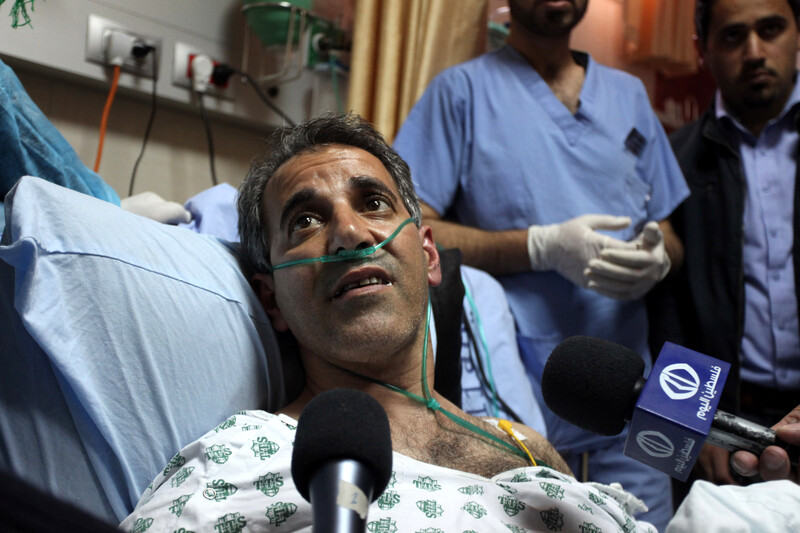The Electronic Intifada Ramallah 18 July 2013

Muhammad Taj after his release from Israeli prison in April.
APA imagesMuhammad Taj knows a great deal about going on hunger strike. Imprisoned by Israel, he refused food for 77 days last year. What is different about his latest announcement that he will starve himself is that it was made following his release.
On 7 July, Taj was surrounded by several senior figures in the Palestinian Authority when he spoke out from a hospital bed in Ramallah.
Taj, who requires a double lung transplant and suffers from pulmonary fibrosis, ripped off his oxygen mask and raised his voice. “I will go on hunger strike,” he said, as his voice became agitated and high pitched before he fell back on his pillows, wheezing heavily.
Taj took the initiative in protest at how he has been denied vital treatment. His announcement drew an immediate plea from Issa Qaraqe, the PA’s minister for prisoners’ affairs.
“Muhammad, listen to me,” Qaraqe said. “We’ve been on your side since the first day you were released. What do you want? How is hunger striking going to help you? We’re here to help.”
Effective
Taj’s protest appears to have been effective.
After discussions with the PA, Taj swiftly agreed to suspend his hunger strike until 11 July. If the PA had not succeeded in finding a European hospital for him by that deadline, he vowed to resume his fast.
On 10 July, a hospital in Vienna said that it would admit Taj. The PA has pledged to pay his medical bills of €92,000 ($120,000). Arrangements for his travel to Austria are currently being made.
Aged 49, Taj was released from a decade in Israeli custody in April. A number of PA ministers and officials visited him during the week after his release and promised to help him receive specialist treatment. When the treatment had not materialized within three months, Taj felt that he had to take action.
Taj has complained that the PA was not delivering on its commitment to help him. Some PA officials, he said, have claimed that he would not be able to get treatment in Europe because he is a former prisoner. This is despite how many other ex-prisoners have been able to travel to Europe via the Allenby Bridge, which connects the West Bank and Jordan. Taj’s elderly mother has also threatened to go on hunger strike at least twice to pressure the PA into aiding her son.
“Like a honeycomb”
According to Taj, his condition is a direct consequence of his many years behind Israeli bars. While he was being held in Hadarim prison in September 2012, he suddenly began gasping heavily. Unable to eat or sleep, he was transferred to the Israeli hospital of Kfar Saba. He was initially injected with cortisone, before a CT scan revealed that he had stage four pulmonary fibrosis. Doctors told him that his only chance of survival was a lung transplant.
“The disease is like a honeycomb that keeps building up on your lungs until it blocks your airway,” Taj said. “The doctors told me it was either a hereditary illness or a result of prolonged subjection to an unhealthy environment. It’s the latter, because there is no history in my family of this illness.
“There is nothing new to treat me with here [in Ramallah]. I’m taking nine types of medicine every day for relief, but I am not getting treated.”
Taj had previously been jailed between 1989 and 1992. In 2003 — after three years on the run — he was arrested again and sentenced to 15 years in prison on charges of belonging to a military cell. He was active in a small leftist group called the Palestinian Liberation Front.
Negligence
Taj accuses his Israeli jailers of serious medical negligence.
In 2004, he was the victim of a brutal crackdown within Gilboa prison. “We were tear-gassed in closed rooms, beaten badly and forced to spend hours under the hot sun,” he said.
That same year, Palestinian prisoners undertook a mass hunger strike that lasted for 19 days. It was after the strike that Taj noticed a persistent cough. From 2004 until 2010, he made regular visits to the prison clinic but was not informed of his condition. In one instance, the Israeli prison authorities informed him that they had lost the results of a CT scan which he underwent.
Many Palestinians believe that Israel decided to release Taj this year to prevent unrest should he die behind bars.
Earlier in April, the 64-year-old prisoner Maysara Abuhamdia died from throat cancer. His death — and allegations that he was a victim of medical negligence by the Israeli authorities — prompted major protests in the West Bank.
Mohammad Awda, a doctor and director of the complaints unit in the PA’s health ministry, said there had been many difficulties finding a hospital where Taj could be treated, before one was found in Vienna.
“We have sent letters to many hospitals in Europe to see which one will offer Taj the transplant operation — the letters are in my hands — but not one hospital responded affirmatively,” he said. “Money is not an issue, but there is no hospital that will grant him the operation.”
With proper care, Taj believes he may be able beat his disease.
“I’ve done research on the Internet, and there’s an 80 percent chance of success with lung transplants, but that drops to 35 percent immediately after the transplant is done based on whether the body accepts the new organs or not,” he said. “I’ve also been told that there’s a small chance I can be cured without a transplant, just [with] groundbreaking treatment.”
Either way, Taj’s battle is not over yet.
Linah Alsaafin is a graduate of Birzeit University and a writer based in Ramallah, West Bank.




